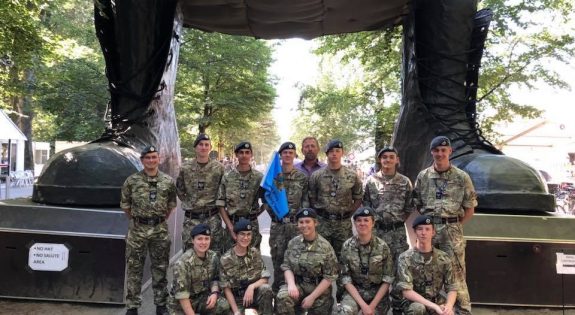News
August 8th 2018
Cadets and reserves at the Nijmegen Marches
The Nijmegen Four Day Marches were last month, this event attracts cadets and reserves every year but why?
The marches are four days long with participants walking either 30KM, 40KM or even 50KM around the city of Nijmegen on each day. The event begun as a way to promote healthy living and exercise but has grown into something much bigger.
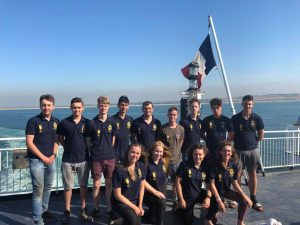
The Trent Wing Road Marching Team on the ferry.
It is the largest multiple day marching event in the world with more than 40,000 people taking part in recent years.
A majority of the participants are now civilians but historically the marches were a military event.
Cadets still regularly take on the challenge though with around 500 Air Cadets completing the marches this year.
The RAF Air Cadet’s Trent Wing sent along their Road Marching team to compete.
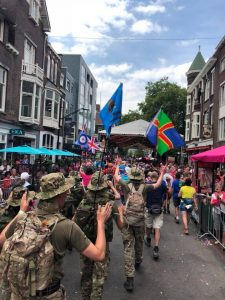
The Trent Wing Road Marching Team making their way through one of the Dutch towns on the route.
Cadet Warrant Officer Matthew Pearce from the Air Cadet’s Lincoln Squadron who is part of the Road Marching Team explained: “The hardest part of Nijmegen is pushing on through the pain and your injury when morale is low and you’re tired. I absolutely would go again and I am already wanting to do the 2019 edition.”
However, this year was not without other challenges as a Europe-wide heatwave meant temperatures during the march climbed over 30 degrees.
Adult volunteer Civilian Instructor Daniel Slack from 1401 (Alfreton and Ripley) Squadron accompanied the cadets this year. He explained: “The heat was the toughest challenge of all this year as it was something we couldn’t train for. I would highly recommend participating to others however it is very difficult and shouldn’t be undertaken without sufficient training.”
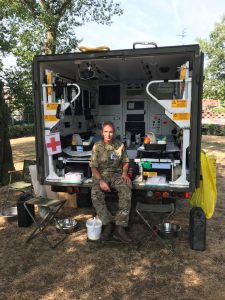
LCpl Hughie Levenie at one of the Nijmegan Marches medical stations
Cadet Sergeant Jenni Williams from Warsop Squadron added: “Completing the marches is something I always wanted to do. I saw it as a great challenge that I needed to try and complete for myself. It is easily the best thing I’ve done in cadets.”
Reserves also attended this event with participants in the East Midlands coming from 158 Regiment, The Royal Logistic Corps and reservists from 254 Medical Regiment were there supporting the event by running First Aid stations.
Lance Corporal Hughie Levenie from the Army Reserve’s 222 Medical Squadron, 254 Medical Regiment, worked with two of his colleagues from Leicester to construct three rest stop areas at different locations throughout the march.
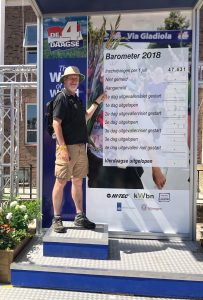
Simon Worsley the Deputy Chief Executive of East Midlands RFCA at the start of day one.
Hughie helped to provide medical cover to more than 700 soldiers and cadets taking part in the march from across the UK. He said: “The exercise for me was a new experience as I hadn’t been involved before. Using our medical skills we provided foot taping, foot care and primary health care to regulars, reservists or cadets before, during or after the marches each day.
“Prior to us attending the marches we had a week of refresher training and specific skill training for medical issues that may have arisen during our time in Holland.
Deputy Chief Executive of East Midlands RFCA, Simon Worsley first took part in the marches nearly 40 years ago and has participated eleven times since. He explained: “It is a unique atmosphere which see tens of thousands if not hundreds of thousands of the Dutch people encouraging participants along the way.
“It provides a physical and mental challenge which I would strongly encourage others to consider but not to underestimate the commitment.
“I am now looking forward to next year’s event which runs from the 16th to the 19th July 2019.”
“Completing the marches is something I always wanted to do. I saw it as a great challenge that I needed to try and complete for myself. It is easily the best thing I’ve done in cadets.”
